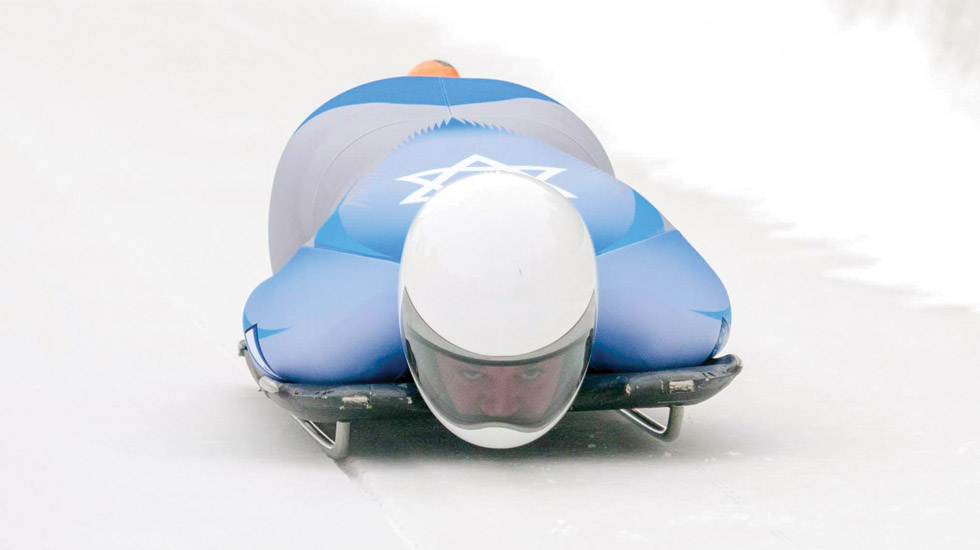Engineering Double Agents
…but what I really want to do is…
[lead]Students and alumni often have passions parallel to their engineering disciplines and follow these passions to great heights. Meet a few of our alumni—and one current student—whose experiences took them in unexpected directions.[/lead]
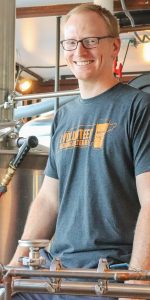
Will Rutemeyer (BS/BioE ’09) is the brewmaster and co-owner at Balter Beerworks in downtown Knoxville. Not too many years ago, he was working with a UT biosystems engineering team to design and build a small recirculating sand filter to manipulate the nitrogen content of wastewater prior to discharge.
“The challenge was to use instrumentation and control systems to optimize for certain microbial activity,” he explained. “Pretty applicable to brewing beer. The biosystems program is a hands-on, design-build-test experience, which is what a small brewer does almost every day.”
Balter is Rutemeyer’s second foray into entrepreneurship. The first didn’t pan out, so he worked for TVA for five years before having another go at self-employment. Balter does a steady business, and at three years along he is slowly getting comfortable with calling it a success.
“I guess the biggest change is the validation after stepping out from a ‘career track’ job and starting something new,” Rutemeyer said. “After the first business experience, it’s really gratifying to see Balter do well.”
The brewing job often finds him tapping into his biosystems experience.
“All the time—simple things like knowing how to dig into a programmable controller manual, how to talk intelligently to a sanitary pump supplier, some basic thermodynamics, and lots and lots of chemistry,” said Rutemeyer. “I’m not sitting down working out integrals or reaction kinetics or whatever, but it’s helpful to have some foundational knowledge when you’re trying to dig into a problem.”
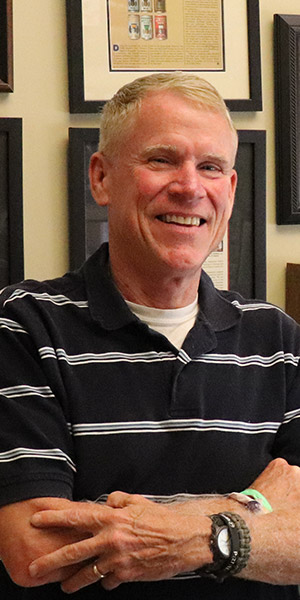
Rick Kuhlman (BS/ISE ’73) has enjoyed a long and varied career since finishing his industrial engineering degree, but he still keeps UT time at his downtown Knoxville office.
“These clocks on the wall are all from UT,” said Kuhlman. “They turn 100 years old next year.”
He acquired around 250 of the clocks long ago at a UT surplus auction. He decided their time had come again during development of the Knoxville Fellows and Café 4 headquarters on Knoxville’s Market Square.
A lot of Kuhlman’s career is tied into UT and Knoxville history. He was working with a wholesale beer distributor when the 1982 World’s Fair geared up, and he spearheaded the creation of an iconic merchandising item.
“We came up with World’s Fair Beer. That was exciting,” he said. “Like everybody else—the World’s Fair was coming to town, we wanted to make our mark.”
To insure the investment, his boss insisted they pre-sell 10,000 cases—240,000 cans.
“He gave me that challenge,” said Kuhlman. “Here I am 31 years old and someone challenges me, I’m going to do it.”
Kuhlman, his son, and some other partners—all UT grads— recently organized a reboot of World’s Fair Beer, just in time for the 35th anniversary. While the original was a light version of the long-defunct Falstaff discount brand, the new version is a definite upgrade.
“It’s more of a richer, higher-alcohol beer,” said Kuhlman. “More hoppy.”
After the original World’s Fair Beer adventure, Kuhlman bought Stefano’s Pizza from its founding owners and operated it for 20 years. He established a key promotional tie-in that assured a legendary position for the near-campus location.
“We were the first real sponsors of the Lady Vols,” he said. “If you walk into Stefano’s now, you’ll see Chamiqua Holdsclaw’s jersey still in there.”
Kuhlman sold Stefano’s in 2004, but remains a loyal customer. He believes that forming solid personal relationships has been an important element throughout his career. He now applies that lesson as director of Knoxville Fellows. This faith-based mentoring organization offers housing, job connections, and study support to 12 to 14 post-graduate men and women at 4 Market Square. Their mission is to help its students build relationships as leaders in the Knoxville community.
“I think the value of people was really brought home to me through industrial engineering,” said Kuhlman. “We can have the greatest plans all day, but if we don’t have somebody that’s willing to do it, we’re in trouble.”
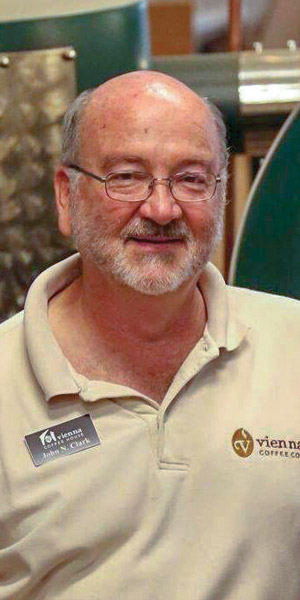
John Clark (BS/ChE ’76) started the Vienna Coffee Company to cover the cost of his growing coffee-roasting hobby. The pastime developed out of necessity as he migrated to the west coast and back over the years working in environmental cleanup for the chemical industry.
“My favorite gigs in the cleanup world seemed to always revolve around burning things,” said Clark, whose career passion was sparked by a co-op assignment at Eastman Chemical. “Incineration involved air and fume measurement and handling, temperature control, burner management and safety, the chemistry of combustion, stack emissions, and nuisance odors.”
The smell of a good cup of joe was never a nuisance to Clark.
“I loved coffee and paid close attention to the little coffee roasters—sort of incinerators—around San Francisco where we raised our family,” he recalled. They couldn’t find the same quality of coffee when they moved back to his hometown of Maryville, Tennessee, in 1996.
“Rather than mail-order California coffee, I just started buying great green coffee and roasting it myself for my own consumption,” said Clark. “That grew from a self-satisfaction exercise to be an expensive hobby. I was giving a lot of coffee away to family and co-workers because it was noticeably better than they had ever tasted locally.”
That led him to launch Vienna as a wholesale enterprise—letting his coffee pay for itself.
“For the first few years, I still burned chemicals for a living while Vienna developed a following,” said Clark. “Then, in 2002, rather than accept a transfer to Philadelphia with my engineering job, I left the corporate world for coffee roasting full time.”
The wholesale business became retail with the opening of their first coffeehouse in Maryville and their second in Knoxville.
“I love being an integral part of the community—a ‘third place’ type of space where everybody knows your name,” said Clark. “The absolute best part is schmoosing the customers and accepting their rave reviews of our product. That never gets old.”
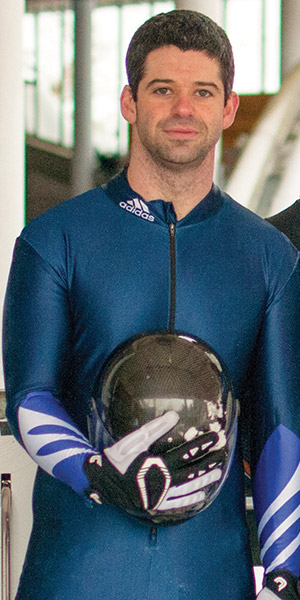
Joel Seligstein (BS/EECS ’06) learned a set of skills during his time in at UT that helped him lead the development of one of the most familiar apps in use today: Facebook Messenger.
“I learned how to work on a variety of engineering challenges: from big data to services to front-end product development,” said Seligstein. “Working on the Messages platform required all of these skills. Having a solid foundation from UT EECS in each of these allowed me to be a leader cross-discipline.”
He launched a couple of other companies following his Facebook time, and went downhill from there—enthusiastically. He dove headfirst into Olympic sledding, specifically the skeleton competition.
“I competed in international skeleton competition for three years leading up to the Olympics,” he said. He missed making the 2018 Olympics with the Israeli Bobsled and Skeleton Team, edged out by a teammate by only a few points. Training for the 2018-2019 season starts in October to prepare for World Cup competitions and hopefully the right to compete at Beijing 2022. Meanwhile, Seligstein maintains a full-speed approach to entrepreneurship.
“Being an entrepreneur is intoxicating and something I cannot run away from,” he explained. “I have been continually investing and advising startups from California to Tennessee and even some in Canada. I find that my leadership and management experience from Facebook and other companies is extremely useful to share with young entrepreneurs.”
Two years ago, Seligstein started Parallel Plaid, a mobile games company.
“Since I was a teenager, I have always been fascinated by the process of building video games,” he said. “The games industry is bigger than ever and game players cross every demographic in high numbers. With Parallel Plaid, I would like to build a business that employees love to work at while making as many people in the world smile as we can.”
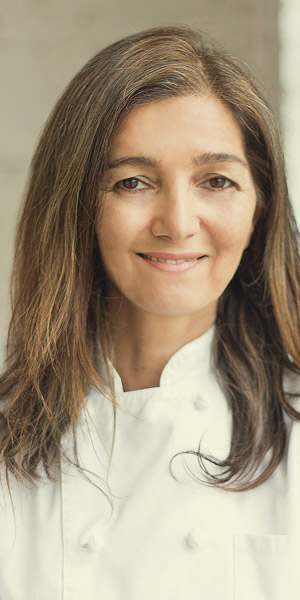
Mahasti Vafaie (BS/ES ’87) opened a little restaurant on Knoxville’s Market Square in 1990, a time when most of the nearby storefronts were dark all day. A minor name refinement after opening turned The Flying Tomato into The Tomato Head, a now-legendary pizza-sandwiches-and-more establishment just a few blocks from the UT campus.
Her earlier post-grad job was a short tenure as an engineer with an oil well servicing company in Mississippi. She describes it as “interesting,” though not her particular cup of tea in the long run.
“Although I didn’t enjoy my first and only engineering job, at the time I thought I would come back to Knoxville, go back to my bartending job for immediate income, and continue to look for a job in engineering,” said Vafaie. She went back to school for a couple of years, then opened The Flying Tomato “on a whim.”
“Up until that point I had never really considered opening a restaurant, nor was it a lifelong dream,” she said. Though just an experiment at first, her engineering background played a huge role in what eventually became The Tomato Head.
“There is a lot of problem solving in the restaurant business,” said Vafaie. “Taking the methodical approach to problem solving that I learned in school has been instrumental in working through all the issues and problems that arise day to day.”
The approach has allowed her business to expand along with the re-blossoming of Knoxville’s downtown. There are now two Tomato Head locations and the related Flour Head Bakery supplies bread for both. The bakery enterprise arose over the years from the restaurant’s need for fresh bread, but not in the bulk quantities offered by other sources.
“I also fell in love with baking bread,” said Vafaie. “I opened Flour Head Bakery to fill the needs of the restaurant as well as fulfill my love for baking.”
The bread and products like Tomato Head hummus are also distributed throughout local stores.
“I love so many different aspects of what I do,” said Vafaie. “However, what I love most is the relationships that I’ve built with staff and customers through the years. My favorite creations on the menu are the ones with stories behind them. Some come from collaborations with some wonderful former employees and some come from regular customers. When I eat or serve one of those menu items, I think about the people and stories behind the food for an entirely emotional as well as culinary experience.”
Vafaie keeps an open mind and an open eye toward plans for the next stage of her “Head-y” career.
“One thing that I’ve learned is that plans always change, so I try to avoid answering this question when I can,” she said. “I have a few new projects I’m working on, but I’m not entirely sure how they will develop—so for now mums the word.”
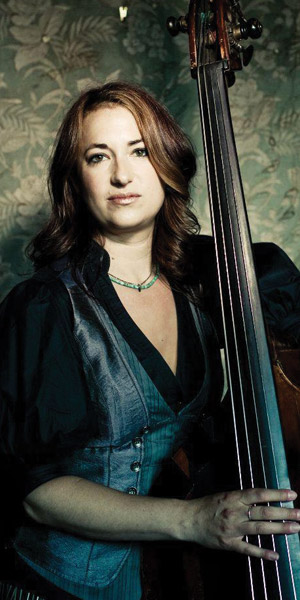
Bryn Davies currently studies nuclear engineering after a long and successful career in quite a different arena. Her previous “day job” was as a Grammy Award-winning professional bass player with some of the biggest names in Americana music.
“I was an independent contractor, meaning I wasn’t beholden to one project or band,” she said. “I took as many gigs as I could at first, then was able to pick and choose projects that I really liked. As I slowly got more well-known around Nashville, I started getting better and better recording sessions and gigs.”
Davies played with bluegrass and Americana folks such as Peter Rowan, Tony Rice, Patty Griffin, and Justin Townes Earle. She recorded on Guy Clark’s last five albums, and did session recording with other top songwriters and players. She still plays part-time backing up singer-songwriters like Scott Miller and Darrell Scott.
“The year before I got off the road full-time, I recorded and toured with Jack White for his ‘Blunderbuss’ project,” said Davies. “That year I got to travel all over the globe, play on numerous TV shows, including the Grammy Awards, all while I was pregnant with my son.”
Her musical experience started early—piano at 3 and cello at 8. She took up the bass in high school and in her senior year received a scholarship to Boston’s Berklee College of Music.
“I thought I might not get another opportunity like that, so I decided to try it out for a year,” said Davies. “I ended up loving it, stayed for three years, joined a band, and went on the road. I did that for 17 years until I met my husband (Knoxville musician Vince Ilagan), then decided it was time to settle down when our son was born.”
She took classes at Pellissippi State Community College and found success in math and science.
“I decided to give engineering a try,” she said. “I looked into the different disciplines offered at UT and was very impressed with the nuclear program. I am loving the program, and the opportunities it has afforded me as an undergrad.”
One such opportunity was participation in the summer 2018 faculty-led study-abroad nuclear engineering program in Prague, Czech Republic—a much more structured experience than touring with a band.
“Almost every part of the day was filled with a planned activity the first week, and the second week was absolutely bananas with lectures, labs, and trying to finish lab reports,” said Davies. “Touring with a band is rarely that structured. It helps when you are friends with the people you are traveling with, and that was a nice aspect of the Prague trip.”
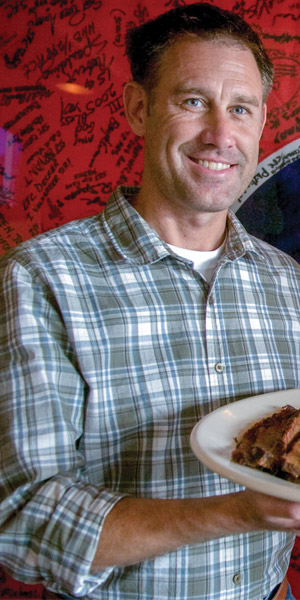
Image courtesy of Sam Young, Knoxville News Sentinel
Robert Nutt (BS/EE ’87) followed a circuitous path to his current career, and it started with actual circuits.
“In the 80’s you were analog, digital, or computer science,” said Nutt. “I went the digital route but ended up getting into the first ASIC (application-specific integrated circuit) classes offered at UT by Professor Bolden. This would have a significant impact on my engineering career a few years after I graduated.”
He spent some time in the fast lane immediately after college.
“I road-raced motorcycles,” he said. He led Team Kino’s Kawasaki racing crew, with duties on and off the racing course. “I managed other racers careers and negotiated their employment contracts.”
He merged his engineering background with his management experience and launched an ASIC company that eventually became a medical-imaging company called Concorde Microsystems, Inc. After selling that company, he became vice president in charge of preclinical imaging at Siemens Molecular Imaging. He struck out on his own again, entering the residential and commercial real estate world with Nutt Properties.
Then he turned on to a delicious dead end.
“A good friend of mine, George Ewart (of George Armor Ewart Architects—on the board of advisors for the UT School of Architecture) was doing competition BBQ and being quite successful at it,” said Nutt. Ewart’s Dead End BBQ Team won the Tennessee state championship in 2008, and represented the state at the Jack Daniel’s Invitational, where they finished quite well.
Nutt cooked with the team a few times and they tossed around the idea of a retail venture.
“When it came down to it, George and I and were the only ones dumb enough to think we could open a restaurant,” said Nutt. So, they opened Dead End BBQ in 2009 on Sutherland Avenue in Knoxville.
The business has been a success, and Nutt sees it as a good distance down the road from circuits and motorcycles.
“There are no parallels with engineering and the restaurant world,” he said. “At first, I thought it was analogous to a factory, of which I had some experience. But the social nature of a restaurant makes it nothing like a normal factory.”
Through the restaurant, Nutt enjoys feeding his neighbors and providing a good place for people to work and grow. He also likes to hear diners talk about how good the food is— even before they know he is the owner.
“No one is getting rich at Dead End,” said Nutt. “But there is a lot of love and pride going into the product we serve.”
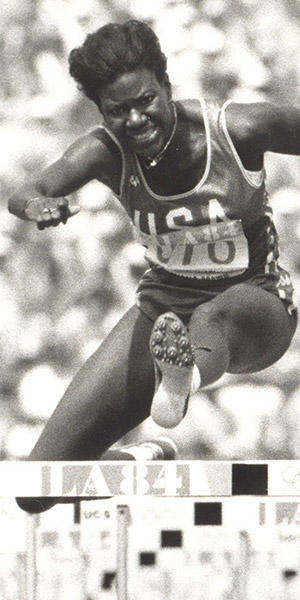
Benita Fitzgerald Mosley (BS/ISE ’84) found an engineering edge in her extracurricular activities while studying at UT. Knowing the right lingo helped her prepare to win a gold medal for the 100 meter hurdles at the 1984 Olympic Games.
“There were all kinds of technical changes that the coach needed to make with me in order to help me run faster, negotiate the hurdles more efficiently, or come out of the blocks more quickly,” said Mosley. “The coaches were able to be a lot more technical with me when they were describing the technique changes and that sort of thing.”
Mosley has kept her focus on encouraging positive change in the sports world, working with USA Track & Field, the Women’s Sports Foundation, the US Olympic Committee, and Women in Telecommunications.
She is currently the CEO of the Laureus Sport for Good Foundation, a nonprofit organization that uses sports involvement to improve the lives of disadvantaged youth.
“Our mission is to improve the lives of youth and unite communities to the power of sport,” said Mosley. Laureus supports programs that will improve physical and mental health and enhance education and employment outcomes for underserved youth.
“It’s coach training, professional development, other development resources,” said Mosley. “It’s coalition building in communities to try to get various sectors together to help these organizations grow and thrive so that they can serve more kids in the communities.”
Laureus trains and places coaches in more than 100 cities around the country, with deeper, community-based work in New Orleans, Atlanta, New York, and Chicago. Mosley’s leadership role continues her life-long, hurdle-clearing momentum that began at UT.
“Industrial engineering includes operations management and time and motion studies,” she said. “You’re a bit of an efficiency expert, always trying to use resources the most effectively and efficiently. I think it’s the analytical perspective that you learn as an engineer that I apply to pretty much all aspects of my life.”
Mosley and family now live in her hometown in Prince William County, Virginia, where she is honored by a street named after her.
“My mother has a school named after her on that street,” said Mosley. “She was one of four teachers selected by the superintendent back in the mid-1960s to help integrate the school system in Prince William County.”
Fannie W. Fitzgerald Elementary School sits at 15500 Benita Fitzgerald Drive. Mosley’s sister teaches there, and her nieces attended from kindergarten to fifth grade.
“The street is wonderful, and I enjoy seeing it,” said Mosley. “But it makes me even prouder to know that my mom’s school sits on the same street.”
